英语作文医患关系
- 格式:doc
- 大小:14.50 KB
- 文档页数:2
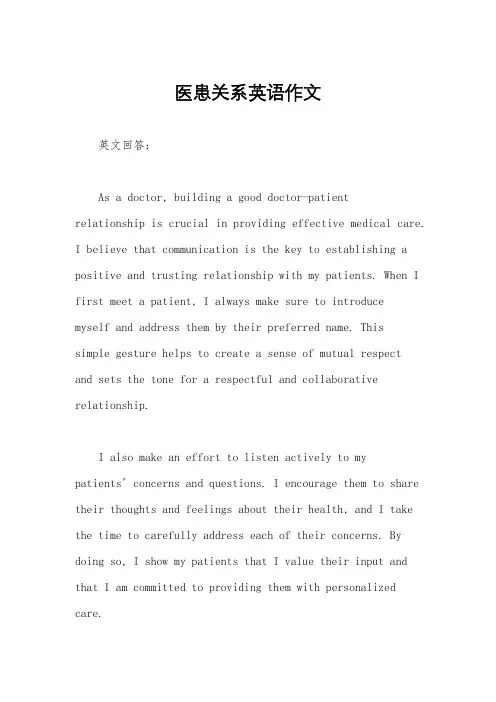
医患关系英语作文英文回答:As a doctor, building a good doctor-patientrelationship is crucial in providing effective medical care.I believe that communication is the key to establishing a positive and trusting relationship with my patients. When I first meet a patient, I always make sure to introducemyself and address them by their preferred name. Thissimple gesture helps to create a sense of mutual respectand sets the tone for a respectful and collaborative relationship.I also make an effort to listen actively to mypatients' concerns and questions. I encourage them to share their thoughts and feelings about their health, and I take the time to carefully address each of their concerns. By doing so, I show my patients that I value their input and that I am committed to providing them with personalized care.In addition to effective communication, I believe that empathy is essential in the doctor-patient relationship. I always strive to put myself in my patients' shoes and understand their experiences and emotions. For example, if a patient is feeling anxious about a medical procedure, I acknowledge their feelings and offer reassurance and support. This helps to build trust and comfort, and it shows my patients that I genuinely care about their well-being.Furthermore, I make it a point to be transparent with my patients. I explain their diagnosis and treatment plan in a clear and understandable manner, and I encourage them to ask questions if they have any doubts or uncertainties. By being open and honest, I empower my patients to take an active role in their own healthcare and make informed decisions about their treatment.Overall, I believe that a strong doctor-patient relationship is built on communication, empathy, and trust. By prioritizing these elements in my interactions withpatients, I can provide them with the best possible care and support.中文回答:作为一名医生,建立良好的医患关系对于提供有效的医疗护理至关重要。
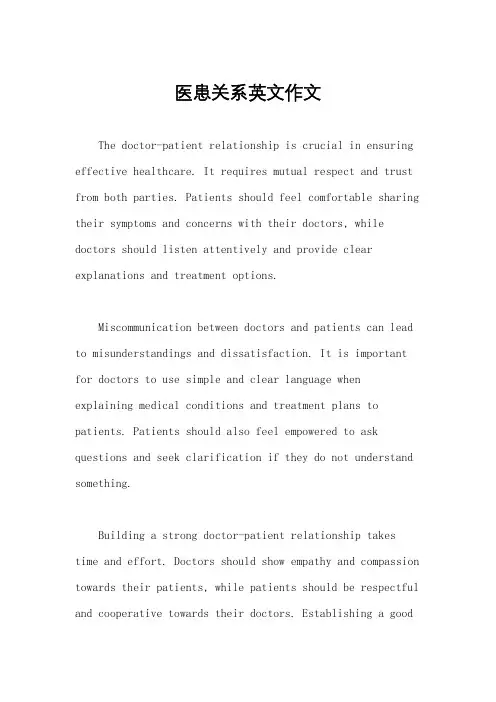
医患关系英文作文The doctor-patient relationship is crucial in ensuring effective healthcare. It requires mutual respect and trust from both parties. Patients should feel comfortable sharing their symptoms and concerns with their doctors, while doctors should listen attentively and provide clear explanations and treatment options.Miscommunication between doctors and patients can lead to misunderstandings and dissatisfaction. It is important for doctors to use simple and clear language when explaining medical conditions and treatment plans to patients. Patients should also feel empowered to ask questions and seek clarification if they do not understand something.Building a strong doctor-patient relationship takes time and effort. Doctors should show empathy and compassion towards their patients, while patients should be respectful and cooperative towards their doctors. Establishing a goodrapport can improve the overall healthcare experience and lead to better health outcomes.Trust is a key component of the doctor-patient relationship. Patients should trust that their doctors have their best interests at heart and are providing them with the best possible care. Doctors, in turn, should trust that their patients are being honest about their symptoms and following their treatment plans.It is important for both doctors and patients to communicate openly and honestly with each other. Patients should feel comfortable discussing their concerns and asking questions, while doctors should be transparent about the risks and benefits of different treatment options. This open dialogue can help build trust and strengthen the doctor-patient relationship.。
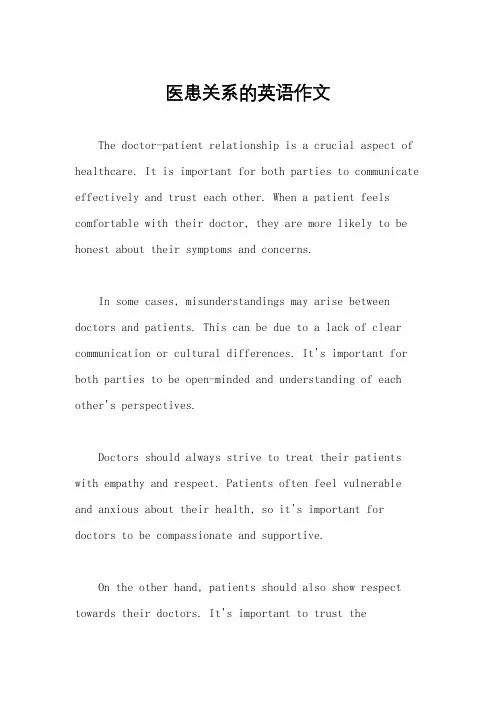
医患关系的英语作文The doctor-patient relationship is a crucial aspect of healthcare. It is important for both parties to communicate effectively and trust each other. When a patient feels comfortable with their doctor, they are more likely to be honest about their symptoms and concerns.In some cases, misunderstandings may arise between doctors and patients. This can be due to a lack of clear communication or cultural differences. It's important for both parties to be open-minded and understanding of each other's perspectives.Doctors should always strive to treat their patients with empathy and respect. Patients often feel vulnerable and anxious about their health, so it's important for doctors to be compassionate and supportive.On the other hand, patients should also show respect towards their doctors. It's important to trust theexpertise of the doctor and follow their advice. Patients should also communicate their concerns and ask questions if they don't understand something.Building a strong doctor-patient relationship takes time and effort from both parties. It's important for doctors to listen to their patients and involve them in the decision-making process. Patients should also take an active role in their healthcare and follow their doctor's instructions.Ultimately, a positive doctor-patient relationship leads to better healthcare outcomes. When there is trust and open communication, both parties can work together towards the common goal of improving the patient's health.。
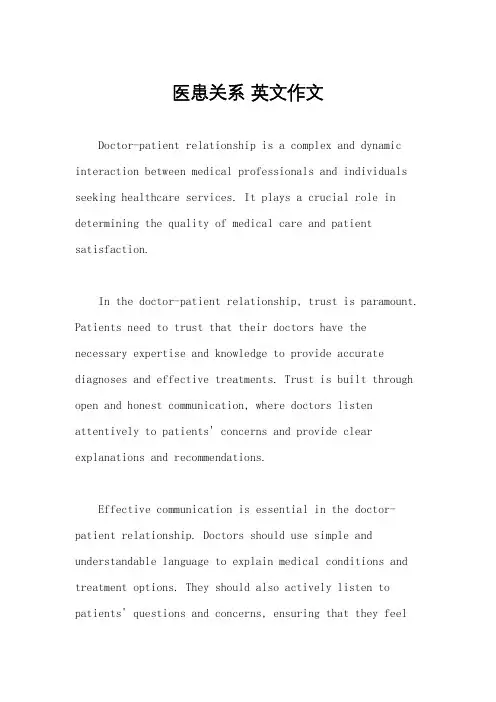
医患关系英文作文Doctor-patient relationship is a complex and dynamic interaction between medical professionals and individuals seeking healthcare services. It plays a crucial role in determining the quality of medical care and patient satisfaction.In the doctor-patient relationship, trust is paramount. Patients need to trust that their doctors have the necessary expertise and knowledge to provide accurate diagnoses and effective treatments. Trust is built through open and honest communication, where doctors listen attentively to patients' concerns and provide clear explanations and recommendations.Effective communication is essential in the doctor-patient relationship. Doctors should use simple and understandable language to explain medical conditions and treatment options. They should also actively listen to patients' questions and concerns, ensuring that they feelheard and understood. This helps to establish a sense of partnership and collaboration between doctors and patients.Empathy is another crucial aspect of the doctor-patient relationship. Doctors should strive to understand patients' emotions and perspectives, acknowledging their fears and anxieties. By showing empathy, doctors can create a supportive and caring environment that promotes healing and well-being.Respect is fundamental in the doctor-patient relationship. Doctors should respect patients' autonomy and individual preferences, involving them in the decision-making process. This fosters a sense of ownership and empowerment, making patients feel valued and respected.Time management is also important in the doctor-patient relationship. Doctors should strive to be punctual and minimize waiting times, respecting patients' schedules and commitments. This demonstrates professionalism and consideration for patients' time.Confidentiality is a cornerstone of the doctor-patient relationship. Patients need to trust that their personal information will be kept confidential. Doctors should maintain strict confidentiality, ensuring that patients' privacy is protected at all times.In conclusion, the doctor-patient relationship is a complex and multifaceted interaction that requires trust, effective communication, empathy, respect, time management, and confidentiality. By fostering a strong and positive doctor-patient relationship, medical professionals can provide high-quality care and improve patient satisfaction.。
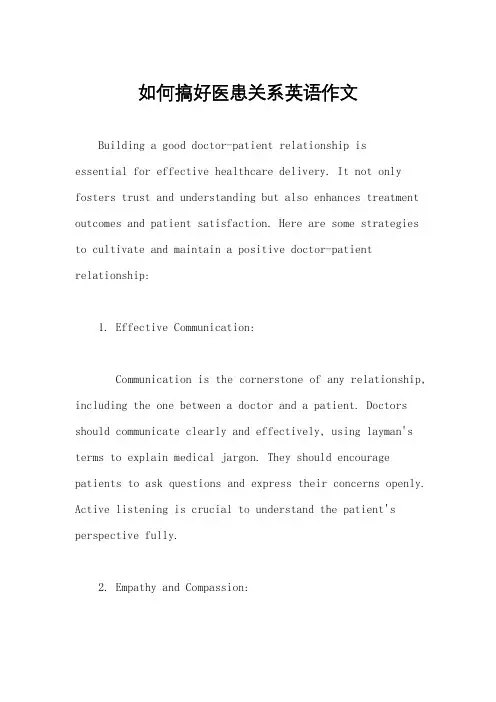
如何搞好医患关系英语作文Building a good doctor-patient relationship isessential for effective healthcare delivery. It not only fosters trust and understanding but also enhances treatment outcomes and patient satisfaction. Here are some strategies to cultivate and maintain a positive doctor-patient relationship:1. Effective Communication:Communication is the cornerstone of any relationship, including the one between a doctor and a patient. Doctors should communicate clearly and effectively, using layman's terms to explain medical jargon. They should encourage patients to ask questions and express their concerns openly. Active listening is crucial to understand the patient's perspective fully.2. Empathy and Compassion:Patients often seek more than just medical expertise; they seek empathy and emotional support. Doctors should demonstrate empathy by acknowledging patients' emotions and showing compassion towards their suffering. Simple gestures like a comforting touch or a reassuring smile can go a long way in building trust and rapport.3. Respect for Patient Autonomy:Respecting patient autonomy means involving them in the decision-making process regarding their treatment. Doctors should provide patients with all relevantinformation about their condition, treatment options, and potential risks and benefits. Patients should feel empowered to make informed decisions about their health.4. Cultural Sensitivity:Healthcare providers should be culturally competent and respectful of patients' diverse backgrounds, beliefs, and values. Understanding cultural nuances can help doctors tailor their approach to communication and treatment,ensuring that it aligns with the patient's cultural preferences and practices.5. Trust and Confidentiality:Trust is the foundation of the doctor-patient relationship. Doctors must uphold patient confidentiality and respect their privacy at all times. Patients shouldfeel confident that their personal information and medical history will remain secure and protected.6. Accessibility and Availability:Being accessible and available to patients, especially in times of need, is crucial for building trust and reliability. Doctors should strive to promptly respond to patient inquiries, whether in person, over the phone, or through electronic communication channels.7. Continuity of Care:Continuity of care refers to the consistent andcoordinated delivery of healthcare services over time. Patients value continuity, as it allows for a deeper understanding of their medical history, preferences, and individual needs. Doctors should strive to maintain continuity by actively engaging with patients throughout their healthcare journey.8. Professionalism and Integrity:Upholding high standards of professionalism and integrity is paramount in the doctor-patient relationship. Doctors should be honest, transparent, and accountable for their actions. Admitting mistakes and addressing concerns openly can strengthen trust and credibility.In conclusion, a good doctor-patient relationship is built on effective communication, empathy, respect, trust, accessibility, continuity of care, cultural sensitivity, and professionalism. By prioritizing these principles, healthcare providers can cultivate positive relationships that enhance patient satisfaction, improve health outcomes, and contribute to overall well-being.。
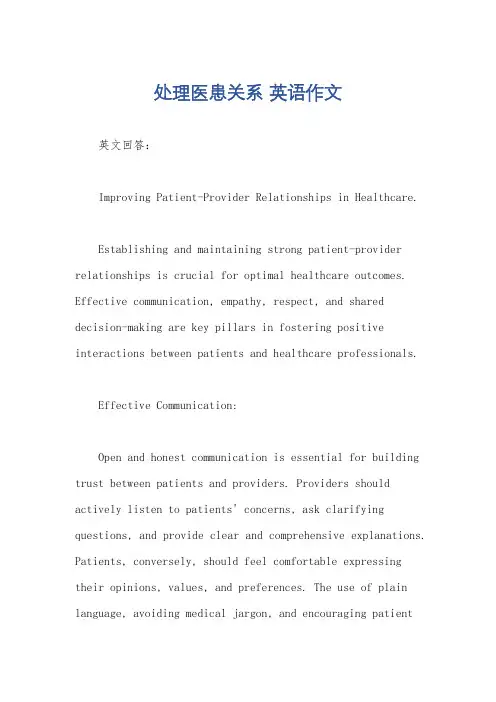
处理医患关系英语作文英文回答:Improving Patient-Provider Relationships in Healthcare.Establishing and maintaining strong patient-provider relationships is crucial for optimal healthcare outcomes. Effective communication, empathy, respect, and shared decision-making are key pillars in fostering positive interactions between patients and healthcare professionals.Effective Communication:Open and honest communication is essential for building trust between patients and providers. Providers should actively listen to patients' concerns, ask clarifying questions, and provide clear and comprehensive explanations. Patients, conversely, should feel comfortable expressing their opinions, values, and preferences. The use of plain language, avoiding medical jargon, and encouraging patientinvolvement in decision-making are all important aspects of effective communication.Empathy and Respect:Healthcare professionals must approach patients with empathy and respect. Recognizing and understanding the patient's perspective, acknowledging their emotions, and showing genuine concern can help create a trusting and supportive environment. It is important for providers to treat patients as individuals with unique needs and preferences, not just as medical conditions.Shared Decision-Making:Involving patients in their healthcare decisions is essential for fostering shared responsibility and improving outcomes. Providers should provide patients with all relevant information about their condition, treatment options, and potential risks and benefits. Patients should be encouraged to ask questions, express their preferences, and participate in discussions that shape their care plan.Shared decision-making empowers patients and promotes a sense of autonomy.Cultural Sensitivity:Healthcare providers must be culturally sensitive to the diverse backgrounds of their patients. Understanding different cultural beliefs, values, and communication styles can help providers build rapport and provide culturally competent care. Making accommodations for language barriers, religious practices, and cultural customs is crucial for fostering inclusivity and ensuring equitable access to healthcare.Technology and Patient Engagement:Technology can play a significant role in improving patient-provider relationships. Patient portals, secure messaging platforms, and telemedicine services can facilitate communication and access to healthcare information. These tools can empower patients to manage their own health, track their progress, and connect withproviders remotely. However, it is important to ensure that technology does not replace human interaction and that patients who may not be comfortable with technology are supported.Feedback and Continuous Improvement:Regular feedback from patients is invaluable for improving patient-provider relationships and overall healthcare quality. Providers should encourage patients to provide feedback on their experiences, including their satisfaction with communication, empathy, and shared decision-making. This feedback can be used to identify areas for improvement and ensure that patient perspectives are incorporated into healthcare practices. Continuous improvement efforts are essential for building strong and enduring patient-provider relationships.中文回答:改善医患关系。
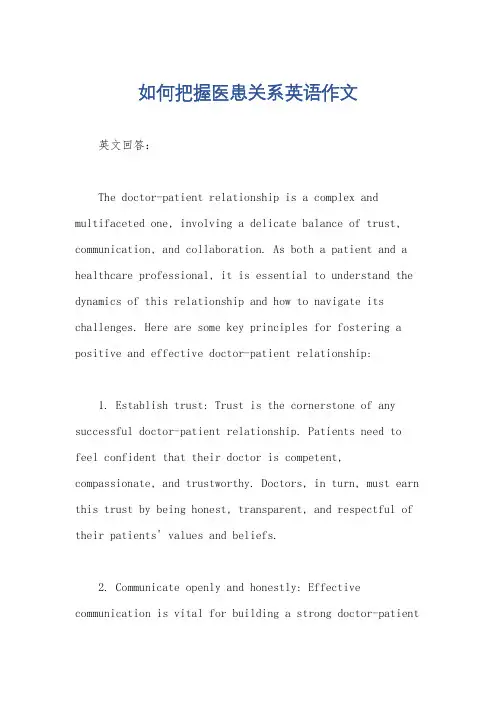
如何把握医患关系英语作文英文回答:The doctor-patient relationship is a complex and multifaceted one, involving a delicate balance of trust, communication, and collaboration. As both a patient and a healthcare professional, it is essential to understand the dynamics of this relationship and how to navigate its challenges. Here are some key principles for fostering a positive and effective doctor-patient relationship:1. Establish trust: Trust is the cornerstone of any successful doctor-patient relationship. Patients need to feel confident that their doctor is competent, compassionate, and trustworthy. Doctors, in turn, must earn this trust by being honest, transparent, and respectful of their patients' values and beliefs.2. Communicate openly and honestly: Effective communication is vital for building a strong doctor-patientrelationship. Patients need to be able to express their concerns, symptoms, and goals clearly and honestly, while doctors must listen attentively and respond in a way thatis both empathetic and informative.3. Collaborate as partners: The doctor-patient relationship should be a collaborative one, where both parties work together to make informed decisions about the patient's care. Doctors should involve patients in discussions about their diagnosis, treatment options, and prognosis, and patients should be encouraged to ask questions and express their preferences.4. Respect boundaries: It is important to respect the boundaries of the doctor-patient relationship. Doctors must maintain patient confidentiality and avoid exploiting the trust that has been placed in them. Patients, in turn, should respect the doctor's time and expertise and not make unreasonable demands or requests.5. Foster empathy and compassion: Empathy and compassion are essential for creating a healing environment.Doctors should strive to understand their patients' perspectives and experiences, and patients should treat their doctors with the same respect and kindness that they would expect from anyone else.中文回答:建立信任,信任是任何成功的医患关系的基石。
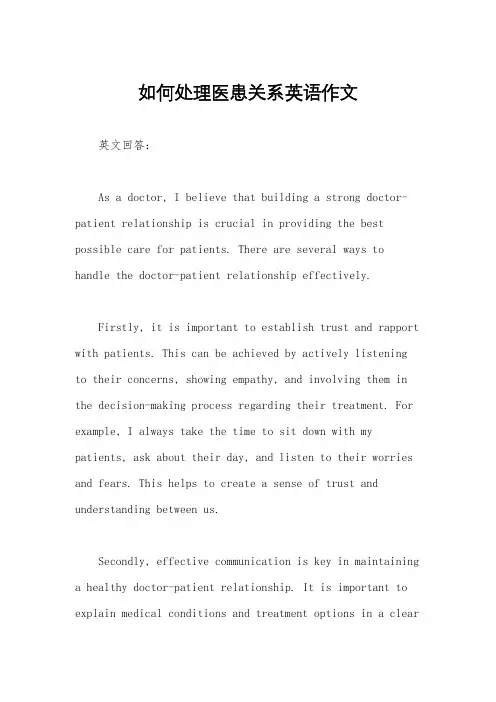
如何处理医患关系英语作文英文回答:As a doctor, I believe that building a strong doctor-patient relationship is crucial in providing the best possible care for patients. There are several ways to handle the doctor-patient relationship effectively.Firstly, it is important to establish trust and rapport with patients. This can be achieved by actively listening to their concerns, showing empathy, and involving them in the decision-making process regarding their treatment. For example, I always take the time to sit down with my patients, ask about their day, and listen to their worries and fears. This helps to create a sense of trust and understanding between us.Secondly, effective communication is key in maintaining a healthy doctor-patient relationship. It is important to explain medical conditions and treatment options in a clearand understandable manner. Using simple language and avoiding medical jargon can help patients feel more at ease and empowered in their own healthcare. For instance, I always make sure to explain any medical terminologies in a way that my patients can understand, and I encourage themto ask questions if they are unsure about anything.Furthermore, it is important to show respect and compassion towards patients. This can be demonstrated through simple gestures such as addressing patients bytheir preferred name, maintaining their privacy, and being mindful of their cultural and personal beliefs. For example, I always make an effort to address my patients by their preferred name and ensure that their privacy is respected during examinations and discussions.In addition, it is essential to be honest and transparent with patients. This includes admitting mistakes, discussing potential risks and uncertainties, and providing realistic expectations about their prognosis. Being openand honest fosters a sense of trust and understanding between doctors and patients. For instance, if a mistake ismade in a patient's treatment, I always take responsibility and explain the situation to the patient, and together we work on finding a solution.Finally, it is important for doctors to show empathy and understanding towards their patients' emotions and concerns. This can be achieved by acknowledging their fears and anxieties, offering emotional support, and being present during difficult times. For example, I always make sure to check in on my patients regularly, especially those who are going through a tough time, and offer a listening ear and words of encouragement.In conclusion, handling the doctor-patient relationship effectively involves building trust and rapport, effective communication, showing respect and compassion, being honest and transparent, and showing empathy and understanding. By following these principles, doctors can ensure that their patients feel valued, respected, and well-cared for.中文回答:作为一名医生,我认为建立良好的医患关系对于为患者提供最佳护理至关重要。
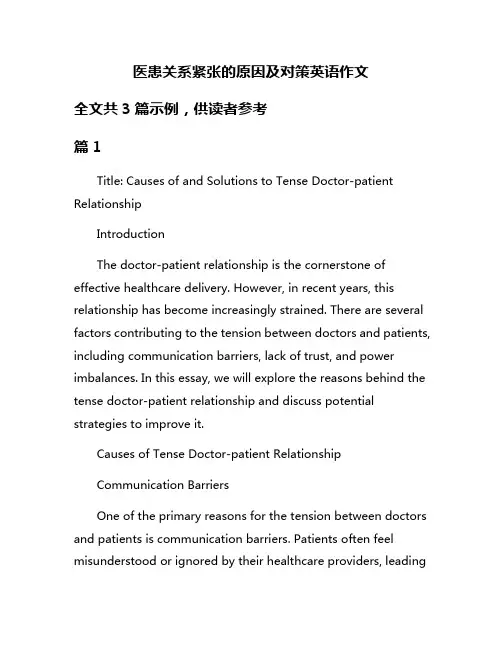
医患关系紧张的原因及对策英语作文全文共3篇示例,供读者参考篇1Title: Causes of and Solutions to Tense Doctor-patient RelationshipIntroductionThe doctor-patient relationship is the cornerstone of effective healthcare delivery. However, in recent years, this relationship has become increasingly strained. There are several factors contributing to the tension between doctors and patients, including communication barriers, lack of trust, and power imbalances. In this essay, we will explore the reasons behind the tense doctor-patient relationship and discuss potential strategies to improve it.Causes of Tense Doctor-patient RelationshipCommunication BarriersOne of the primary reasons for the tension between doctors and patients is communication barriers. Patients often feel misunderstood or ignored by their healthcare providers, leadingto feelings of frustration and mistrust. Additionally, doctors may struggle to effectively communicate complex medical information in a way that patients can understand, further exacerbating the problem.Lack of TrustTrust is essential for a successful doctor-patient relationship. However, many patients feel that their doctors are more focused on profits than their well-being, leading to a breakdown in trust. Similarly, doctors may be skeptical of patients who do not follow their medical advice, further eroding trust on both sides.Power ImbalancesThere is an inherent power imbalance in the doctor-patient relationship, with doctors holding significant authority over their patients. This power dynamic can lead to feelings of intimidation or helplessness among patients, making them less likely to question their doctor’s recommendations or voice their concerns.Strategies to Improve the Doctor-patient RelationshipEnhanced Communication SkillsImproving communication skills is crucial for fostering a positive doctor-patient relationship. Doctors should make aneffort to listen actively to their patients, explain medical information in a clear and understandable way, and encourage patients to ask questions. By enhancing communication, doctors can build trust and establish a more collaborative relationship with their patients.Empathy and CompassionEmpathy and compassion are essential qualities for all healthcare providers. By demonstrating understanding and kindness towards their patients, doctors can help to alleviate feelings of mistrust and create a more supportive environment for healing. Patients are more likely to feel valued and respected when they sense that their doctors genuinely care about their well-being.Shared Decision-makingShared decision-making is a collaborative approach to medical care in which doctors and patients work together to make treatment decisions. This approach empowers patients to take an active role in their healthcare, leading to better outcomes and greater patient satisfaction. By involving patients in the decision-making process, doctors can build trust and strengthen the doctor-patient relationship.ConclusionIn conclusion, the tense doctor-patient relationship is a complex issue with deep-rooted causes. By addressing communication barriers, building trust, and promoting shared decision-making, doctors can improve the quality of care they provide and strengthen their relationships with their patients. Ultimately, a positive doctor-patient relationship is essential for delivering effective healthcare and improving patient outcomes.篇2Title: Reasons for and Solutions to the Tense Doctor-Patient RelationshipIn recent years, the doctor-patient relationship has become increasingly strained, with many reports of conflicts and misunderstandings between medical professionals and their patients. There are several reasons for this tension, but with proactive measures and effective communication, the relationship can be improved.Firstly, one of the main reasons for the tense doctor-patient relationship is the lack of understanding and trust between both parties. Patients often feel overwhelmed and intimidated by medical professionals, leading to misunderstandings andmiscommunication. On the other hand, doctors may feel frustrated by demanding patients who question their expertise, causing tension and friction.Another reason for the strained relationship is the lack of time and resources in the healthcare system. Doctors are often overworked and under immense pressure to see a large number of patients in a short amount of time. As a result, they may not be able to provide the necessary care and attention to each patient, leading to dissatisfaction and frustration.Furthermore, the rise of social media and online platforms has made it easier for patients to access information and communicate with other patients about their experiences. This has led to a significant shift in power dynamics, with patients feeling empowered to question and challenge the advice of their doctors. This can create a sense of distrust and animosity between doctors and patients.To improve the doctor-patient relationship, both parties must work together to build trust and understanding. Doctors should take the time to listen to their patients and address their concerns with empathy and compassion. Patients, on the other hand, should be active participants in their own healthcare andcommunicate openly with their doctors about their symptoms and preferences.Additionally, the healthcare system should provide more support and resources to doctors to ensure they have the time and tools to provide quality care to their patients. This may involve hiring more staff, implementing more efficient processes, and investing in technology to streamline administrative tasks.In conclusion, the tense doctor-patient relationship can be attributed to a lack of understanding, trust, and communication between both parties. By recognizing these issues and taking proactive measures to address them, the relationship can be improved for the benefit of both patients and doctors. It is essential for both parties to work together to build a strong and trusting relationship based on mutual respect and communication.篇3Title: Causes of Tense Doctor-Patient Relationship and Strategies to Improve itIn recent years, the doctor-patient relationship has become increasingly tense in many countries. There are various factors contributing to this issue, and it is essential to identify thesecauses in order to develop effective strategies to improve the relationship between healthcare providers and patients.One of the main reasons for the strained doctor-patient relationship is the lack of communication and understanding between the two parties. Patients often feel that doctors do not listen to their concerns or take the time to explain their diagnosis and treatment plan. On the other hand, healthcare providers may feel overwhelmed by the demands of their job and fail to communicate effectively with their patients. This leads to a lack of trust and mutual respect, which can further exacerbate the tension between doctors and patients.Another factor that contributes to the tension in the doctor-patient relationship is the increasing commercialization of healthcare. In many countries, healthcare providers are under pressure to see as many patients as possible in order to increase revenue. This can lead to a lack of focus on patient care and a more transactional approach to healthcare. Patients may feel that doctors are more interested in making money than in providing them with the best possible care, which can erode trust and lead to a breakdown in the relationship.Moreover, the high level of stress and burnout among healthcare providers can also affect their interactions withpatients. Doctors who are overworked and under immense pressure may become less patient and compassionate towards their patients, which can create a hostile environment and further strain the doctor-patient relationship. Patients, on the other hand, may feel that they are not receiving the attention and care they deserve, leading to frustration and resentment.To improve the doctor-patient relationship, healthcare providers must prioritize effective communication and empathy. Doctors should take the time to listen to their patients' concerns, explain their diagnosis and treatment plan in a clear and understandable manner, and involve patients in thedecision-making process. Patients, on the other hand, should also strive to communicate openly and honestly with their doctors, ask questions, and actively participate in their own healthcare.In addition, it is crucial for healthcare systems to address the root causes of tension in the doctor-patient relationship. This includes improving working conditions for healthcare providers, reducing the focus on profit in healthcare, and promoting a culture of empathy and compassion in medical practice. By creating a supportive and collaborative environment for bothdoctors and patients, we can build a stronger and more positive doctor-patient relationship.In conclusion, the tension in the doctor-patient relationship is a complex issue that requires a multifaceted approach to address. By focusing on effective communication, empathy, and addressing the root causes of tension, we can work towards building a healthier and more positive relationship between healthcare providers and patients. It is essential for all stakeholders in the healthcare system to work together to improve the doctor-patient relationship and ultimately enhance the quality of care for all patients.。
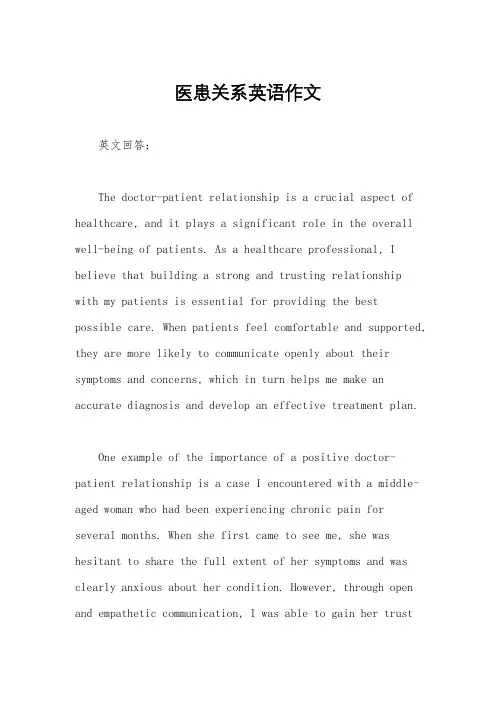
医患关系英语作文英文回答:The doctor-patient relationship is a crucial aspect of healthcare, and it plays a significant role in the overall well-being of patients. As a healthcare professional, I believe that building a strong and trusting relationshipwith my patients is essential for providing the best possible care. When patients feel comfortable and supported, they are more likely to communicate openly about their symptoms and concerns, which in turn helps me make an accurate diagnosis and develop an effective treatment plan.One example of the importance of a positive doctor-patient relationship is a case I encountered with a middle-aged woman who had been experiencing chronic pain for several months. When she first came to see me, she was hesitant to share the full extent of her symptoms and was clearly anxious about her condition. However, through open and empathetic communication, I was able to gain her trustand reassure her that I was there to help. As a result, she began to open up about her pain, and together we were able to explore various treatment options and ultimately improve her quality of life.In addition to improving patient outcomes, a strong doctor-patient relationship also contributes to a more positive work environment for healthcare providers. When patients feel valued and respected, they are more likely to adhere to treatment plans and follow medical advice, leading to better health outcomes and reduced healthcare costs. Furthermore, a positive relationship with patients can also lead to greater job satisfaction for healthcare professionals, as it fosters a sense of fulfillment and purpose in their work.中文回答:医患关系是医疗保健中至关重要的一环,对患者的整体健康状况起着重要作用。
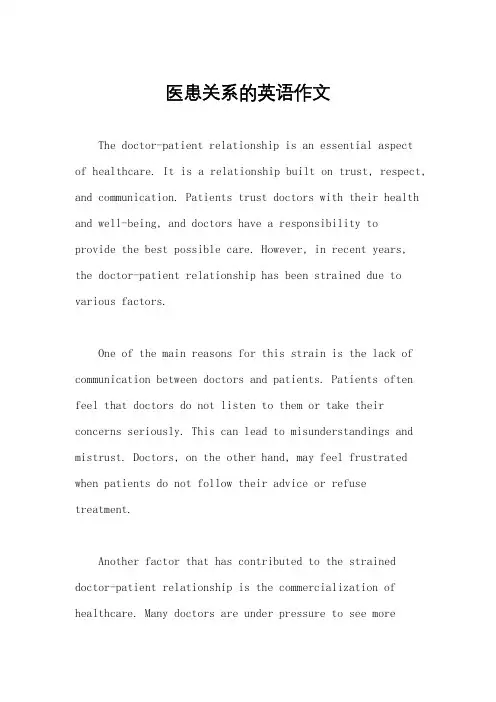
医患关系的英语作文The doctor-patient relationship is an essential aspectof healthcare. It is a relationship built on trust, respect, and communication. Patients trust doctors with their health and well-being, and doctors have a responsibility toprovide the best possible care. However, in recent years, the doctor-patient relationship has been strained due to various factors.One of the main reasons for this strain is the lack of communication between doctors and patients. Patients often feel that doctors do not listen to them or take their concerns seriously. This can lead to misunderstandings and mistrust. Doctors, on the other hand, may feel frustrated when patients do not follow their advice or refuse treatment.Another factor that has contributed to the strained doctor-patient relationship is the commercialization of healthcare. Many doctors are under pressure to see morepatients and generate more revenue. This can lead to a focus on profit rather than patient care. Patients may feel like they are being treated like customers rather than individuals with unique needs.Additionally, the internet has made it easier for patients to access medical information. While this can be beneficial, it can also lead to patients self-diagnosing and self-treating, which can be dangerous. This can also lead to patients questioning their doctor's advice and treatment plans.To improve the doctor-patient relationship, both doctors and patients need to take responsibility. Doctors need to listen to their patients and take their concerns seriously. They should also take the time to explain their diagnosis and treatment plan in a way that patients can understand. Patients, on the other hand, should trust their doctors and follow their advice. They should also communicate their concerns and ask questions when they do not understand something.In conclusion, the doctor-patient relationship is crucial to providing quality healthcare. It is a relationship built on trust, respect, and communication. While there are challenges that can strain this relationship, both doctors and patients can take steps to improve it. By working together, we can ensure that patients receive the best possible care.。
How to Handle Doctor-Patient Relationships In today's healthcare environment, doctor-patient relationships are crucial for effective treatment and positive patient outcomes. However, these relationships can often be complex and challenging, especially when communication breakdowns, misunderstandings, and trust issues arise. To ensure optimal care and patient satisfaction, it's essential to approach doctor-patient relationships with compassion, respect, and transparency. **Communication is Key**Effective communication is the foundation of any successful doctor-patient relationship. Physicians must take the time to listen actively and empathize with their patients, understanding their concerns, fears, and expectations. Patients often feel more comfortable sharing their symptoms, medical history, and lifestyle habits when they feel heard and respected. It's also crucial for doctors to provide clear, concise information about diagnoses, treatment options, and expected outcomes. This helps patients feel informed and involved in their care plan.**Empathy and Compassion**Doctors must demonstrate empathy and compassion towards their patients, recognizing that each individual is unique and may be experiencing significant emotional distress. By acknowledging patients' feelings and offering support, doctors can establish a sense of trust and cooperation that is essential for effective treatment. Additionally, doctors should strive to provide a non-judgmental environment where patients feel safe disclosing sensitive information.**Transparency and Education**Transparency is another crucial aspect of doctor-patient relationships. Physicians should provide patients with detailed information about their condition, including the risks and benefits of different treatment options. They should also explain the potential side effects and outcomes of treatment, allowing patients to make informed decisions about their care. Additionally, doctors should educate patients about their condition and its management, empowering them to take an active role in their own healthcare.**Respect for Patient Autonomy**Respecting patient autonomy is essential in maintaining healthy doctor-patient relationships. Patients have theright to make decisions about their own healthcare, and doctors should respect these decisions even if they differ from their own recommendations. By involving patients inthe decision-making process and explaining the reasons for their recommendations, doctors can foster trust and cooperation while also ensuring that patients feelrespected and informed.**Conclusion**In summary, handling doctor-patient relationships effectively requires a commitment to communication, empathy, compassion, transparency, and respect for patient autonomy. By fostering these values, doctors can create positive, supportive environments that promote optimal patient outcomes and satisfaction. By prioritizing patient-centered care, doctors can build lasting relationships with their patients, enhancing the overall quality of healthcare delivery.**如何处理医患关系**在当今的医疗环境中,医患关系对于有效治疗和患者积极康复至关重要。
医患关系英语作文英文回答:Doctor-Patient Relationship: A Delicate Balance。
The doctor-patient relationship is a unique and complex one, characterized by a profound trust and mutual respect.It is a relationship built upon open communication, empathy, and a shared goal of enhancing the patient's well-being.At the heart of this relationship lies the doctor'sduty to provide competent medical care and the patient's right to autonomy and informed decision-making. Doctorsmust possess a comprehensive understanding of medical science, technical skills, and ethical principles. Theymust also be able to communicate effectively with patients, addressing their concerns and explaining treatment optionsin a clear and understandable manner.Patients, in turn, have the right to be informed abouttheir health conditions, treatment options, and potential risks and benefits. They should be involved in decisions regarding their own care, and their preferences and values should be respected. The patient-doctor relationship is not simply a matter of providing medical services; it is also about building a rapport, establishing trust, and fostering a supportive and collaborative environment.However, this delicate balance can be challenged by a variety of factors, including miscommunication, unrealistic expectations, disparities in power, and the influence of technology. It is essential that both doctors and patients work together to navigate these challenges and maintain a healthy and productive relationship.中文回答:医患关系,微妙的平衡。
医患关系英文作文Doctor-patient relationship is a complex and important topic that affects the quality of healthcare delivery. It involves communication, trust, and mutual respect between healthcare providers and patients. 。
In many cases, doctors and patients have different expectations and goals. Patients often want quick and effective treatment, while doctors focus on providing the best possible care. This can lead to misunderstandings and conflicts, which can damage the relationship between the two parties. 。
Effective communication is essential for building a strong doctor-patient relationship. Doctors should take the time to listen to their patients and understand their concerns. Patients, on the other hand, should be open and honest with their doctors about their symptoms and medical history. This will help doctors make accurate diagnoses and provide appropriate treatment. 。
医患关系英语作文Doctor-patient relationship is a crucial aspect of healthcare. It involves mutual trust, respect, and communication. Patients rely on doctors for their expertise and guidance, while doctors depend on patients for their cooperation and honesty.In the medical field, building a good doctor-patient relationship is essential for effective treatment. Patients should feel comfortable discussing their symptoms and concerns with their doctors. Likewise, doctors shouldlisten attentively and show empathy towards their patients.Miscommunication and misunderstanding can lead to negative outcomes in healthcare. Therefore, it is important for both doctors and patients to communicate openly and honestly. This can help in making accurate diagnoses and developing suitable treatment plans.Patients should also be proactive in their healthcare.They should ask questions and seek clarification about their condition and treatment. On the other hand, doctors should provide clear explanations and involve patients in decision-making regarding their health.In some cases, conflicts may arise in the doctor-patient relationship. It is important for both parties to address these conflicts in a respectful and professional manner. Open communication and willingness to understand each other's perspective can help in resolving conflicts.Overall, a positive doctor-patient relationship is beneficial for the well-being of patients and the effectiveness of medical treatment. It requires effort and understanding from both doctors and patients to maintain a healthy and productive relationship.。
As an important component of the social system ,physician—patient relationship
plays a guiding and fundamental role in creating a harmonious healthcare
environment 。However ,due to certain social ,ethical and moral factors ,the
current physician—patient relationship is not favorable ,and various
contradictions in physician—patient relationship are becoming barriers in building
up a harmonious society 。In recent years ,the tense relationship between doctors
and patients has caused extensive concern 。In order to enable medicine return to
its“merciful”nature and relieve the tension of relationship between doctors and
patients,there’re several points as follows 。
首先,重建医患信任。信任是建立良好医患关系的基础。第二,加强医患沟通。医生与
病人的有效沟通与交流是诊疗实践的重要技术,它在对病人病情的认识,治疗和康复中都起
着十分重要的作用。第三,通过建立积极的医院形象包括医疗服务,质量和环境来发展新型
的医患关系。医院必须尽可能提高医务人员技术水平和业务素质 ,确保医疗安全。第四,倡
导健康的医院文化,促进医德医风建设。最后一点,弘扬中华民族传统医学人文关怀的优秀
思想,开展具有人文精神的“人性化服务”:尊重、关爱、服务病人。
First ,reestablish doctor—patient trust relationship 。Trust is the basis for
constructing a good physician—patient relationship 。Secondly ,strengthen the
communication between doctors and patients 。Communication between doctors and
patients is the important skill for learning sickness ,treatment and
rehabilitation 。Third ,develop new harmonious physician—patient relationship by
creating positive hospital image of medical service ,quality and environment 。
Hospitals should try their best to increase the medical skills and occupational
qualities of their staffs to assure the safety of medical work.。Fourth ,initiate
healthy hospital culture and promote medical ethics and style 。Finally ,advance
and enrich the ideology of Chinese traditional Medical Humanities Concern 。It should
develop humanistic service ,which includes respecting ,caring for and serving the
patients 。
化解医患矛盾,构建和谐医患关系,不仅需要医患双方的努力,还需要社会的支持。同
样,社会也应把医患关系的构建作为自身健全发展的一个重要任务。
To relieve physician—patient conflicts and construct a harmonious physician
—patient relationship need not only the efforts of both sides but also the support
of the society 。Similarly ,the society should regard the building of physician
—patient relationship as a significant task in self—improvement and development 。